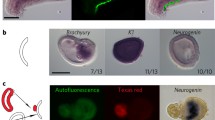Abstract
In Xenopus embryos, a truncated type II activin receptor (Δ1XAR1), capable of blocking signals by several transforming growth factor (TGF)-β family members, can induce neural tissue suggesting neural fate is under inhibitory control. Activin and bone morphogenetic protein 4 (BMP4) can act as neural inhibitors but only BMP4 can induce epidermis in Xenopus ectodermal cells. We have used the pluripotent mouse embryonal carcinoma cell line P19 to examine whether the mechanisms of ectodermal cell fate decisions are conserved among vertebrates. We show that a P19 cell line expressing Δ1XAR1 will differentiate into neurons. In addition, BMP4 inhibits retinoic acid (RA)-induced neural differentiation of P19 cells and induces keratin expression. These results suggest that in mammals as in amphibians neural fate is under inhibitory control and BMP4 can alter ectodermal differentiation.
Similar content being viewed by others
Author information
Authors and Affiliations
Additional information
Received: 23 September 1996 / Accepted: 8 January 1997
Rights and permissions
About this article
Cite this article
Hoodless, P., Hemmati-Brivanlou, A. Inhibitory control of neural differentiation in mammalian cells. Dev Gene Evol 207, 19–28 (1997). https://doi.org/10.1007/s004270050088
Issue Date:
DOI: https://doi.org/10.1007/s004270050088




